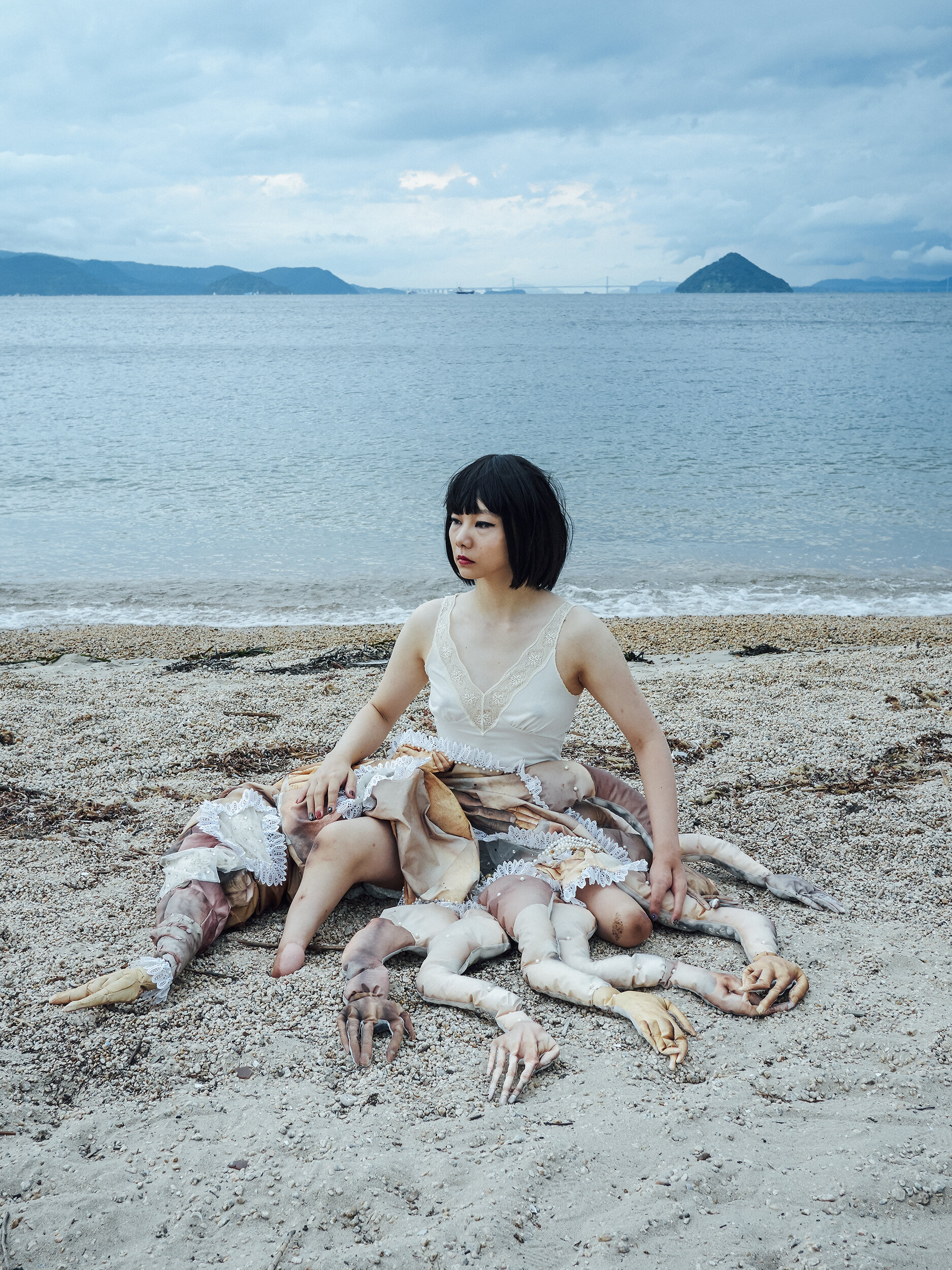Maison Européenne de la Photographie | Paris
3. September - 24. Oktober 2021
Home Again
Mari Katayama
Bystander #016, 2016 | ©︎ Mari Katayama
Mari Katayama, die als Kind an einer seltenen Krankheit litt, musste sich im Alter von neun Jahren für eine Teilamputation ihrer Gliedmaßen entscheiden. Sie transzendiert ihren Zustand und ihre Behinderung in ein kühnes und revolutionäres Werk, das die Grenzen des fotografischen Mediums ausreizt. Die aufwendige und völlig kontrollierte Inszenierung ihrer Selbstporträts und die Herstellung ihres eigenen Bildes stellen jede konventionelle Vorstellung von "Behinderung" in Frage.
Die Ausstellung Home Again versammelt Arbeiten, die seit 2009 entstanden sind, präsentiert aber auch erstmals die Serie "In the Water". Diese neue Arbeit ist das Ergebnis der kürzlichen Geburt ihrer Tochter, von der Mari Katayama sagt, "dass es endlich jemanden auf dieser Welt gibt, der ihren Körper als normal ansieht und betrachtet".
Von den Küsten von Naoshima bis zur verschmutzten Landschaft um ihr Zuhause in Gunma hinterfragt Mari Katayamas Titel "Home Again" den Begriff des "Natürlichen", des "Beschädigten" oder des "Verlorenen" und wendet ihn sowohl auf einen vom Menschen unberührten - oder im Gegenteil veränderten - Ort als auch auf ihre eigene Person an.
Atteinte enfant d’une maladie rare, Mari Katayama, a dû choisir, à l’âge de neuf ans, l’amputation partielle de ses membres. Elle transcende sa condition et son handicap en une œuvre audacieuse et révolutionnaire qui repousse les limites du médium photographique. Les mises en scène de ses autoportraits si élaborées et totalement contrôlées, ainsi que la fabrication de sa propre image, s’opposent à toute notion conventionnelle du « handicap ».
L’exposition Home Again rassemble des œuvres réalisées depuis 2009, mais elle présente également pour la première fois la série « In the Water ». Ce nouveau travail résulte de la récente naissance de sa fille, et dont Mari Katayama dit « qu’il existe enfin dans ce monde quelqu’un qui voit et considère son corps comme normal ».
Des rivages de Naoshima au paysage pollué autour de sa maison à Gunma, Mari Katayama interroge par le titre « Home Again » la notion du « naturel », de l’« endommagé » ou du « perdu », l’appliquant à la fois à un endroit laissé intact – ou au contraire modifié – par l’homme, ainsi qu’à sa propre personne.
Mari Katayama, che ha sofferto di una malattia rara da bambino, ha dovuto scegliere l'amputazione parziale degli arti all'età di nove anni. Trascende la sua condizione e la sua disabilità in un corpo di lavoro audace e rivoluzionario che spinge i confini del mezzo fotografico. La messa in scena elaborata e totalmente controllata dei suoi autoritratti e la creazione della sua stessa immagine sfidano qualsiasi nozione convenzionale di "disabilità".
La mostra Home Again riunisce opere realizzate dal 2009, ma presenta anche per la prima volta la serie "In the Water". Questo nuovo lavoro è il risultato della recente nascita di sua figlia, di cui Mari Katayama dice "c'è finalmente qualcuno in questo mondo che vede e considera il suo corpo come normale".
Dalle rive di Naoshima al paesaggio inquinato intorno alla sua casa di Gunma, il titolo di Mari Katayama "Home Again" mette in discussione la nozione di "naturale", "danneggiato" o "perduto", applicandola sia a un luogo lasciato intatto - o al contrario modificato - dall'uomo, sia alla sua stessa persona.
Afflicted as a child with a rare disease, Mari Katayama had to choose, at the age of nine, the partial amputation of her limbs. She transcends her condition and disability into a bold and revolutionary body of work that pushes the boundaries of the photographic medium. The elaborate and totally controlled staging of her self-portraits, as well as the fabrication of her own image, oppose any conventional notion of "disability.
The exhibition Home Again gathers works made since 2009, but it also presents for the first time the series "In the Water". This new work is the result of the recent birth of her daughter, of which Mari Katayama says "there is finally someone in this world who sees and considers her body as normal".
From the shores of Naoshima to the polluted landscape around her home in Gunma, Mari Katayama's title "Home Again" questions the notion of the "natural," the "damaged," or the "lost," applying it both to a place left untouched - or altered - by man, as well as to her own person.

